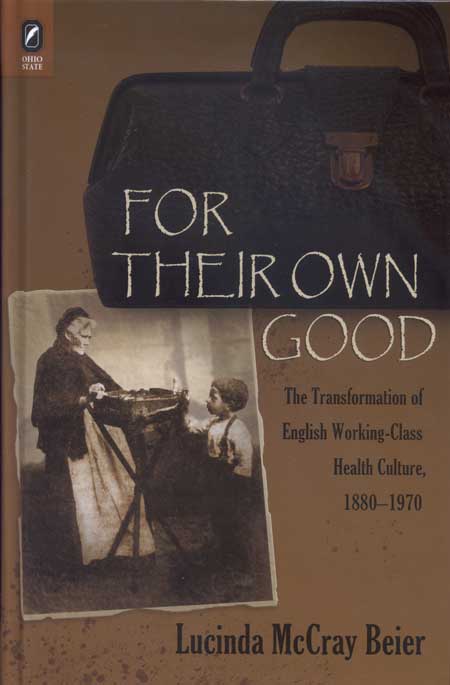For Their Own GoodThe Transformation of English Working-Class Health Culture, 1880–1970Lucinda McCray Beier |
 10/24/2008 History/Europe/Great Britain 409 pp. 6x9  $72.95 cloth 978-0-8142-1094-9 Add cloth to shopping cart $29.95 PDF eBook 978-0-8142-7545-0 Add PDF eBook to shopping cart $29.95 paper 978-0-8142-5253-6 Add paper to shopping cart Shopping Cart Instructions Review/Change Shopping Cart & Check-out | |||
|
“Lucinda Beier departs from the more usual professional and administrative, top-down, approach to the topics of health and medicine to examine working class health culture through the lens of oral history, supplemented by reference to medical memories and Medical Officer of Health reports. . . . [She] provides a revealing account of traditional stoicism and resource in the face of pain, illness and death, and the ways in which these responses were altered by the coming of the welfare state and of modern biomedicine.” —Journal of Social History “For Their Own Good is an excellent and compelling work on an under-researched topic. Lucinda McCray Beier writes with flair, commitment, and fluency. The primary resource material is unusual and well marshaled and supports a number of interlocking and broadly convincing conclusions.” —Bill Luckin, research professor in urban history, University of Bolton “Beier’s scholarship is highly original and will add a much-needed ‘bottom up’ perspective to the field. She builds on the oral history work of Elizabeth Roberts, but there is no other work with its targeted focus on working-class attitudes toward medical care and health culture and how health care fit into the larger working-class society and cultural expectations.” —Joanne Klein, associate professor of history, Boise State University In For Their Own Good Lucinda McCray Beier examines the interactions between working-class health culture and official provision of health services and medical care in three English communities between 1880 and 1970. Based on 239 oral history interviews of laypeople and annual public health reports, this book considers gender, class, political, economic, and cultural aspects of the mid-twentieth-century shift in responsibility for illness, birth, and death from the informal domestic and neighborhood sphere to the purview of professional, institutionally based authorities. For Their Own Good is a case study, located in a particular place and time, of a phenomenon that has occurred in all Western nations and is now happening worldwide. As in Barrow, Lancaster, and Preston, in most circumstances, the transition from traditional to modern medicine is stimulated and enforced from the top down. Current global struggles with AIDS, overpopulation, malaria, malnutrition, and other killers offer powerful reminders that elite knowledge and strategies rarely result in success unless laypeople are engaged and invested in solutions. Furthermore, as this book demonstrates, the desired transition to Western medicine carries the twin burdens of the loss of lay ability to prevent and manage ill-health, on one hand, and the demand that political elites and medical professionals meet proliferating health care needs and demands, on the other.
| ||||


